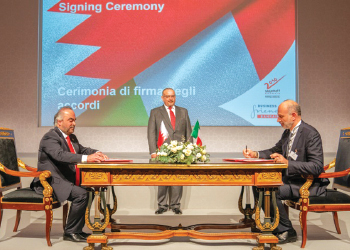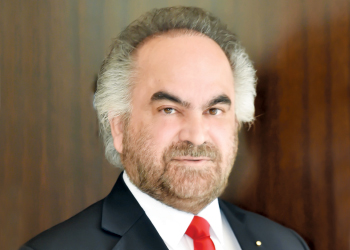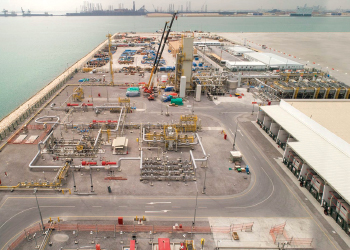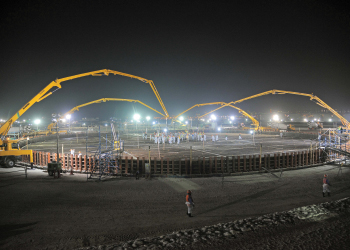
 Jawahery ... surpassing targets
Jawahery ... surpassing targets
In 2019, Gulf Petrochemical Industries Company eclipsed its own 2018 performance, registering unprecendented growth. Various measures adopted have helped it maintain a competitive edge despite a slump in the market
Gulf Petrochemical Industries Company (GPIC) saw a stellar year in 2019, surpassing its own production and exports targets while lowering costs thus turning around the company’s fortunes in what was perhaps its best year to date.
For 2019, the company had set a 6.7 per cent higher production target than 2018. However, GPIC not only met that target, it surpassed it by a good 4 per cent.
"The total production (in 2019) was not only higher than the previous year but it has been the highest ever production and export achieved since inception," GPIC President Dr Abdulrahman Jawahery tells Abdulaziz Khattak of OGN.
The company met several milestones in 2019 including lowering the cost of production by 3 per cent compared to what was targetted; achieving 61,700 MT higher production than budgeted (3.9 per cent over the budget for the year); and achieving 4.2 per cent higher exports against the budgeted.
Jawahery says GPIC’s success of being able to sell at a profit was because of various cost optimisation and control measures helping the company maintain a competitive edge in the market despite the slump.
 |
Dr Ahmed Al Sharyan, Chairman, GPIC |
"Given the current adverse global economic conditions, I believe GPIC did extremely well with our performance in such harsh conditions and we will, therefore, continue operating on the same business plan to takes us through 2020," he remarks.
GPIC has a total production capacity of 1.5 million tonnes (MT), with roughly 40 per cent of this being urea, followed by ammonia and methanol, at more or less the same amount.
"Our 2019 production breakdown reflects the percentages mentioned above, where urea reached 727,244 MT, followed by ammonia at 456,917 MT and methanol at 451,429 MT," says Jawahery.
In 2019, GPIC achieved the targetted cumulative capacity utilisation for all the three plants, with the methanol plant having achieved a cumulative capacity utilisation of 103.1 per cent, ammonia plant 106.4 per cent, and the urea plant 117.2 per cent.
This year, however, the output capacity will be lower than 2019 because of a planned turnaround in November 2020.
Jawahery says all plants will be taken offline and will undergo extensive maintenance and improvements over a period of 24 days. This will be done in an effort to ensure the smooth running of all plants for the next cycle of operation.
GPIC’s previous turnaround was in 2018 and which was completed with approximately 108,000 man-days.
 |
"Production capacity in 2019 will thus be just over 651,100 MT of urea, 425,200 MT of methanol and ammonia will be 412,360 MT," says Jawahery.
When it comes to exports, GPIC in 2019 exported a total of 1.25 million tonnes (MT) of ammonia, urea and methanol, which is 13 per cent higher than 2018.
Giving a breakdown, Jawahery says 463,435 tonnes of methanol (5.4 per cent higher than 2018), 725,491 tonnes of urea (5.2 per cent higher than 2018) and 58,599 tonnes of ammonia (56.6 per cent higher than 2018) were exported.
"As for 2020, the total planned export of ammonia, urea and methanol in 2020 will be 1.11 million tonnes," he adds.
The delivered sustained returns of GPIC throughout the years have won it praise and recognition from its board members and shareholders alike and this is due its relentless and driven attitude towards sustainability, corporate social responsibility and beyond excellence results.
"This stewardship has helped charter GPIC’s course safely through the current volatile market and economic conditions that are affecting the industry. We have continued to build on the enhancement and streamlining of our internal processes as well as our focus on cost optimisation and business continuity," he says.
 |
"Throughout 2019, GPIC invested extensively into building the capabilities of the kingdom’s future generations through its various educational programmes and partnerships. The company has also continued to pass on its knowledge and expertise across the industry and across regions and continents, in sustaining the environment and ensuring the adoption of sustainable technologies and processes," says Jawahery.
In 2019, GPIC approved capex projects worth $12 million. These included:
• Replacement of the obsolete Mark VI control system and obsolete generator control protection panel (GCPP) PLC.
• Replacement of electronic governor and protection system of urea plant CO2 compressor.
• Replacement of steam generator coil EB-1202-5 with upgraded material in the methanol plant.
• Replacement of synthesis loop piping from P1 to P11 (downstream of HV-08001/3/4/5/6) in the ammonia plant (Phase 2).
• Relining of urea reactor (R-8201) bottom dish end and 1 m of bottom cylindrical portion with 25-22-2 material.
• Replacement of obsolete analysers for safe operation of the plants.
• Replacement of various obsolete field instrumentation for the safe operation of the plants.
• Replacement of complex emergency paging system.
• Enhance the existing cyber security controls.
The company also undertook a number of reliability initiatives in 2019 including the improvement of the reliability centred maintenance (RCM) system, improving cyber security, new reporting metrics and dashboards as well as conducting certified training for maintenance employees.
In terms of orders, 5,400 preventive maintenance orders were undertaken in 2019 along with 2,100 corrective maintenance orders. Modifications and capex projects totaling 117 were also initiated in the same period.
GPIC’s in-house spare parts manufacturing programme has been a boon for the company, having recorded a significant saving in 2019.
Environment
GPIC is one of the first petrochemical companies in the Middle East to embark on a Carbon Dioxide Recovery (CDR) Project, to cut down greenhouse gas (GHG) emissions and to improve overall efficiency of natural resources by enhanced production of methanol and urea in its complex.
Jawahery says: "Its CDR unit utilises the latest state-of-the-art and commercially-proven technology from MHI, Japan, to recover carbon dioxide from the methanol reformer flue gas stack to increase methanol production by 120 metric tonnes per day (tpd) and urea production by 150 tpd. The project was completed successfully in December 2009 ahead of its planned schedule."
He says the CDR unit has helped in minimising CO2 emission through its recovery from the waste flue gas to the atmosphere. The unit captures 450 tonnes of CO2 per day, resulting in GHG emissions reducing by 0.12 million tonnes of CO2 annually. Since 2009, GPIC’s CDR plant has reduced more than 1.3 million tonnes of CO2 emissions into the atmosphere.
Health & Safety
 |
Safety, health and environmental performance is at the top of GPIC's agenda |
"Safety, health and environmental performance is at the top of our agenda and is measured, reported, evaluated and continuously improved upon. It is part of our company’s regular review process and we have set stringent, clear and visible goals with leading and lagging indicators throughout all levels and processes of the organisation."
He says as a forward-looking petrochemical and fertiliser company, GPIC recognises that commitment to safety is the foundation for building and maintaining trust and public confidence. "It is part of being a good citizen, a good neighbour and a good partner. It defines who we are and what we stand for."
Jawahery says: "By instilling a culture that ensures the well-being and safety of our employees, we empower them to focus on the details and to do what is right the first time, every time. This leads to improved performance and reliable, consistent and predictable delivery of our high-quality products."
To attain this, GPIC focuses and applies measures to all elements of safety culture; systems and processes; skills and knowledge of individuals; behaviours; attitudes, perception and leadership.
Jawahery says they have long realised and recognised that there is no single reliable measure of health and safety performance. "What is required is a variety of measures providing information on a range of health and safety activities," he adds.
Furthermore, GPIC understands the employee safety dimension of sustainability as well and has, therefore, started proactively leveraging the OHS and sustainability connection.
"With the launch of the UN’s 17 Sustainable Development Goals (SDGs), GPIC is using these global strategies to underpin its sustainability efforts," says Jawahery.
The company in 2019 successfully achieved its excellent safety records through visible safety leadership, focused risk management, enhanced safety and emergency response training, audits and benchmarking.
Some of the noteworthy initiatives and programmes of 2019 include the weekly safety summary highlighting the incidents, root cause analysis, positives and focus areas. Fire plans for high-risk scenarios were also prepared enhancing the emergency response. OHSAS 18001 was successfully transited to ISO 45001.
Jawahery says these continual improvement efforts culminated in achieving a record over 32 million working hours for its workforce and contractors without any lost time accident, exceeding 16 years of safe work.
In recognition of its efforts, GPIC was awarded the RoSPA International Safety and Chemical Sector Awards by the Royal Society for Prevention of Accidents (RoSPA) from the UK for its excellence in occupational health, safety and the environment. These awards were presented to GPIC for its outstanding application of SHE standards and for undertaking a leading role in this area.
The company also successfully completed the construction and commissioning of its new $8.8-million urea formaldehyde (UF-85) unit for the urea plant with no lost time injury, and for which it won the Ministry of Labour’s award for the "Excellence in the Occupational Safety and Safe Working Environment".
Jawahery says GPIC had from the very beginning learned that competitive advantage could only result from combining social and environmental considerations into business strategies.
"With this mindset, GPIC’s business strategies over the past 40 years have reflected the intense desire to instill sustainability principles into the organisational culture and imprint it on everyday behaviour. This has helped GPIC to follow a clear path to excellence in the field of sustainability and corporate responsibility."
He adds: "Our journey of sustainability continues and is supported by our revised vision, mission and core values, in line with our future aspirations and stakeholder needs. We continue moving forward with our Corporate Strategy 2030, identifying potential areas of growth, including the debottlenecking of our existing facilities for improved energy efficiency and enhanced production capabilities."
SDGs
GPIC strongly supports the UN’s 17 SDGs by proactively aligning its business priorities with these goals. It also remains firmly committed to the UN Global Compact and their ten principles.
"We are also committed to its signature platforms such as the Women Empowerment Principles (WEPs) and the Food and Agriculture Business Principles (FAB 6 Principles), already having issued our annual advanced level Communication on Progress Report (COP) in March 2018. Our commitment to post COP 21 requirements remains firm and we have issued our fourth GHG Inventory report in 2019 on IPCC guidelines."
The company has since 2012 been sharing its sustainability performance globally through the GRI Sustainability reports, highlighting its commitment to enhanced transparency and accountability. GPIC’s fifth GRI report was issued in March 2018 in accordance with the latest GRI standards and the next is due in March.
GPIC’s environmental performance in 2019 was outstanding. It was able to reduce its carbon emissions by around 1.3 million tonnes since the start of its Carbon Dioxide Recovery (CDR) plant in 2009.
The company’s energy efficient LED lighting project continues. Since 2013, it has replaced 6,281 conventional lights with LEDs within its complex, resulting in an energy saving of 1416.5 MWH/Y and translating into cost saving of $106,404 and a CO2 emission reduction of 706 tonnes/year.
On the other hand, GPIC’s waste recycling of paper, plastic, cardboard and aluminum is also gaining momentum, with around 160 tonnes recycled since 2005 and 67 tonnes of recycled waste paper donated to charity.
For students, GPIC has initiated an environmental awareness programme in local schools that has benefitted more than 42,000 students. The schools environmental research programme has entered its 16th cycle.
"Both these programmes have won the best CSR projects in the partnerships category. We were also bestowed with several awards and accolades, most noteworthy of them being Mohammed Bin Rashid Al Maktoum Business Excellence Award and the Business Innovation Award, the Arabia CSR Award, Dubai Chamber CSR Label Award."
Meanwhile, GPIC’s initiative of tree plantation in schools known as the Green Wave Campaign was launched in 2015 ago in partnership with Bahrain’s Ministry of Education and the UN Environment Office in Bahrain. Under this programme, 90 schools have benefitted with the distribution of 3,600 saplings.
"This programme is promoting a culture of biodiversity and awareness of the importance of agriculture amongst young people," says Jawahery.
Also in 2019, a new garden was inaugurated within the GPIC complex where 150 neem trees were planted.
"GPIC has to date invested a total of $530 million to improve safety, reliability, performance and preservation of the environment," says Jawahery.









































































